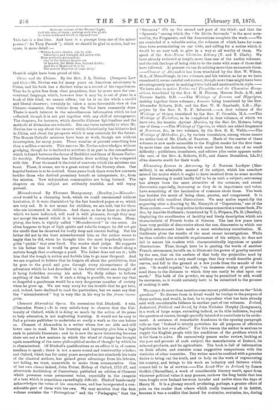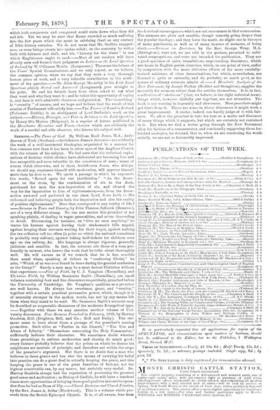Elementary Lessons in Astronomy, by J. Norman Lockyer (Mac- millan),
is an admirable manual of its subject, which has somehow missed the notice which it ought to have received from us some months ago. Interesting it could hardly fail to be on such a subject; astronomy has always been the most attractive of the sciences, and recent discoveries especially, increasing as they do in importance and value, have something of the fascination of romance about them. The book has besides the merit of being clear, precise, and compressed. It is furnished with excellent illustrations. We may notice especially the engraving after a drawing by Mr. Nasmyth of "Copernicus," one of the Moon craters. —We may notice in the same connection a recent book, The Sun, by Ameclee Guillemin ; translated by T. L. Phipson, Ph. D. (Bentley), displaying the excellencies of lucidity and lively description which are characteristic of French hooka of Science. The last few years have been very prolific of discoveries about the sun, discoveries to which our English astronomers have made a most satisfactory contribution. M. Guillemin gives the results of the most recent investigations. While he thus satisfies the scientific requirements of his subject, he does not fail to amuse his readers with characteristically ingenious or quaint illustrations. Thus, though here he is quoting the words of another French astronomer, he tells us, to illustrate the power of gravity exerted by the sun, that on the surface of that body the projectiles used by artillery would have a very small range, that they would describe great curves, and fall to the ground at a few yards from the muzzle of the gam "It would require," ho adds, "an immense charge of powder to send them to the distance to which they can easily be shot upon our earth." The bulk of the powder, we may be permitted to add, would be enormous, as it would certainly have to be submitted to the process of making it safe.
We cannot do more than mention some recent publications on the "Irish question." To discuss them in detail would be foreign to the purpose of these notices, and would, in fact, be to reproduce what has been already said with considerable fullness in another part of our columns. Ireland, industrial, Political, and Social, by John Nicholas Murphy (Longmans), is a work of large scope, extending indeed, as its title indicates, beyond the question of tenure, though specially intended to contribute to its settle- ment. A sentence of remarkable frankness in the opening paragraph tells us that "Ireland is utterly powerless for all purposes of effective legislation in her own affairs." For this reason the author is anxious to supply the English people with the conditions of the problem which it is for them to solve. He successively passes under review, looking at the past and present of each subject, the manufactures of Ireland, its mineral products, and its agriculture. The book is full of information on Irish affairs, and contains some suggestive comparisons with the statistics of other countries. The writer must be credited with a genuine desire to bring out the troth, and to help on the work of regenerating his country, and brings to his work an industry and fairness which cannot fail to be of service.—The Land-War in Ireland, by James Godkin (Macmillan), a work of considerable literary merit, apart from whatever political value it may possess, reviews the long battle that has been fought over Ireland between invader and native since the days of Henry II. It is a gloomy record, producing, perhaps, a greater effect of pain on the reader than others which really transcend it in horror, because it was a conflict that lasted for centuries, centuries, too, during which both conquerors and conquered could write down what they did and felt. Yet we may be sure that Rome crowded as much suffering into the few years which she spent in subduing Gaul as any century of Irish history contains. We do not mean that Mr. Godkin exagger- ates, or even brings events into undue relief ; on the contrary, he writes both with fairness and skill, and his " history for the times " is one which Englishmen ought to read.—Most of our readers will have already seen and formed their judgment on Letters on the Land Question of Ireland by W. O'Connor Morris. (Longmans.) Those are the letters of the Times' Special Commissioner, and wo only repeat, as we believe, the common opinion, when we say that they wore a very thorough honest piece of work, and a very valuable contribution to the settle- ment of the question.—Mr. John George 3Iacarthy in his Irish Land Questions plainly Stated and Answered (Longmans), goes straight to his point. He and his friends have been often asked to say what they want and why they want it ; and ho takes this opportunity of saying it, and does it with admirable clearness and precision. The 'something ' is "security " of tenure, and we hope and believe that the result of this session of Parliament will satisfy him.—The Tenure of Land in Ireland, (Falconer: Dublin) is an abridgment of Lord Dufferin's work on the subject.—History, Principle, and Fact in Relation to the Irish Question, by Henry Dix Hutton (Ridgway), is a reprint of letters published in the Manchester Examiner and Times,—letters which are evidently the work of a careful and able observer, who knows his subject well.



































 Previous page
Previous page